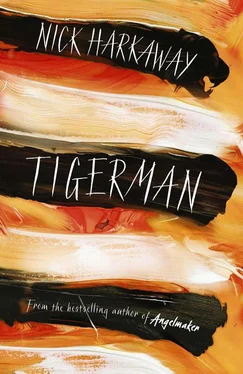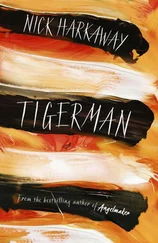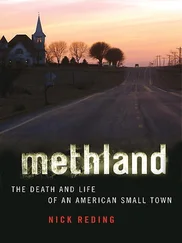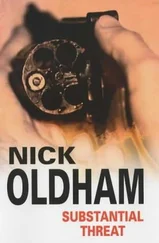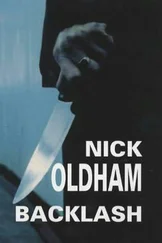They sent him to Mancreu. Take a break, Lester. Not long on active for you now, is it? Nearly forty. Well, serve it out. We’ll find something for you .
He watched the waves in the harbour and thought about Beneseffe’s stolen fish. He would be quite content to stay here. Mancreu life — strange and undemanding and disjointed — suited him. He wondered if there were some other abandoned island somewhere without the death warrant hanging over it, a place which needed a sergeant. El Hierro, Shola had said. Maybe El Hierro. Then he felt like a traitor for having the thought, as if he were married to a sick woman and coveted her sister. Well, he would stay as long as he was permitted. But there was nothing wicked in wondering where he would go, after. That was just life. You had to be practical.
There was a presence at his side and the noise of a pocket radio and he recognised, in a brief lull in the breeze, the scent of the boy. His friend smelled of earth today, rather than salt, so the Sergeant guessed he had not been out on his boat. The radio dangled by a lanyard from the boy’s hand, and a breathless northern English voice was detailing Real Madrid’s latest triumph on the football pitch. A famous victory, the voice said, which seemed rather premature. Time would decide whether it was famous or not, and most likely it would be just another game.
The boy politely switched off the radio and the Sergeant got to his feet. They walked along beside the water until they came to a broad stretch of sea wall that was flat and warm, in a part of Beauville which was now mostly deserted. Both sat. The boy said nothing. The sea washed and swooshed. After a moment, the boy reached into his bag and produced something wrapped in greaseproof paper and foil.
They had an arrangement regarding food which was acceptable to both. The Sergeant had a considerable inventory of baked beans and spaghetti hoops at Brighton House which amounted to more than a single person could consume over the space of some years. The boy had made it clear that he regarded baked beans as the highest form of culinary genius, but had a correspondingly low opinion of the spaghetti hoop. As with the continuity of stories and the football of Real Madrid, the matter was akin to a religious one, and no heresies were tolerated. The barbecued bean, for example, was taboo. Alphabet shapes could not move him to a gentler opinion of pasta in sauce.
The Sergeant, meanwhile, had long ago eaten all the tinned produce, all the syrups and ketchups and brines, that he could stand. He wanted nothing so much as fresh food. He loved the dubious Mancreu cheeses and the dry sesame biscuits which went with them. He loved the oily sardines and goat-knuckle stews, the mashed roots and flatbreads which were the island’s staples. He ate whatever was in season and whatever was for sale and thought himself in paradise. Anything so long as he never had to swallow another mouthful from a tin.
They had therefore evolved a practice suited to their likes. The boy would arrive with fruit, cheese, and bread, and the Sergeant would supply baked beans. They would begin by toasting the bread over a pocket gas burner and warming some beans for the boy. Each would make some disparaging face in the direction of his friend’s meal, and then they would sit in loud, masticatory silence for a while, and then speak of whatever might be on their minds.
The Sergeant extended the plate of warmed beans, and the boy took them. He ate one mouthful, and then the next. He seemed to be worried that the heating had been uneven, because he was touching each heaped spoon with the tip of his tongue, like a lizard. The Sergeant took a big bite of cheese and bread.
After a while — it was quite in keeping with the moment, he hoped, not an imposition but a natural thing to do — the Sergeant spoke.
‘Do you have. . family?’
The boy shook his head gravely. ‘I am too young.’
A lack of precision could take you to some strange places with a child living on Mancreu, where anything was possible.
‘I mean parents. Brothers and sisters. Uncles, even.’
‘Aunts and cousins and bears, oh my!’ He grinned.
‘Really?’
‘Sure. Of course.’ He made an encompassing gesture. Mancreu life: everyone is family. If you live in the same street or on the same farm, you’re cousins or brothers. An older man is an uncle if he functions as an uncle.
‘Blood family?’
‘Someplace.’
‘But here?’ Who takes care of you apart from me? Who’s missing you, right now? Where are you when you’re not with me? He felt like a jealous husband. Or how he imagined it would be to be one.
The boy shrugged his private shrug, or perhaps it was merely that his mind had wandered, for the next thing he said was that he had heard the British government had captured a flying saucer in the early part of the 1900s, and did the Sergeant know anything about it? Would the Queen know? Or would it be hidden away from everyone, the way the Roswell saucer was at Area 51? The Sergeant answered these questions with the same serious attention he would have given to anything the boy said, as if they were entirely reasonable and not at all preposterous, and after a while longer watching the waves they went back the way they had come — if not together, then two men going in the same direction at the same time.
They ended up, inevitably, at Shola’s. The Sergeant recognised by the boy’s heavy knapsack and his contemplative quiet that there was reading to be done. He had in his own pocket the paperback of The Friends of Eddie Coyle , and was finding it entirely engrossing: ‘Jackie Brown, at twenty-six, with no expression on his face, said that he could get some guns.’ He therefore made his way to his own familiar seat, and the boy, without a backward glance, went to the bodyguard’s table, and spread out a sheaf of the work of the great Bendis, the bard of Cleveland. Shola obliged them both with quiet and what provisions they desired, and the common life of Mancreu came and went around them, until the day became the evening and the Sergeant’s left buttock began to ache in a way he could not any longer ignore. Age, he supposed, and bad furniture.
Shola peered at the Sergeant, appearing to read something in his face which was both familiar and a little bit sad. ‘Anaesthetic,’ he offered. ‘Special Mancreu style.’ He produced a bottle from beneath the counter and poured himself a single measure in a little red glass.
The rum was brown and thick, and there were veins like treacle in it. Every September, Shola harvested his small marijuana crop — the plant grew well on the island, at least on the sheltered side — and selected some of the best leaves. He dipped them briefly in boiling water to kill anything living, and pushed a handful into each of twelve bottles of sweet white alcohol. Then he buried the bottles in the mud at the back of his house, and the sun baked the mud and the mud coddled the rum, so that when he dug it up again in July the leaves were beaded with resiny sap. He shook the bottles one by one until the rum was the colour of crude oil, then poured it through a fresh linen cloth, and finally stoppered the finished product again and laid the bottles by for special occasions and dire emergencies. It was quite respectable. Mancreu men had brewed fortified rums for as long as anyone could remember. There were pictures of missionaries drinking them and losing their inhibitions, and stories of Knights Templar finding out about them and mistaking them for Christ’s Blood. The original indigenes had made theirs with a local hallucinogenic root, but no one used that any more because it was addictive and had the unfortunate property of sending you blind and mad. Marijuana was better, and you could sell it to the Black Fleet for Swiss francs. Shola no longer trusted dollars. The Chinese owned the dollar, Shola said. It was only a matter of time.
Читать дальше
Конец ознакомительного отрывка
Купить книгу
